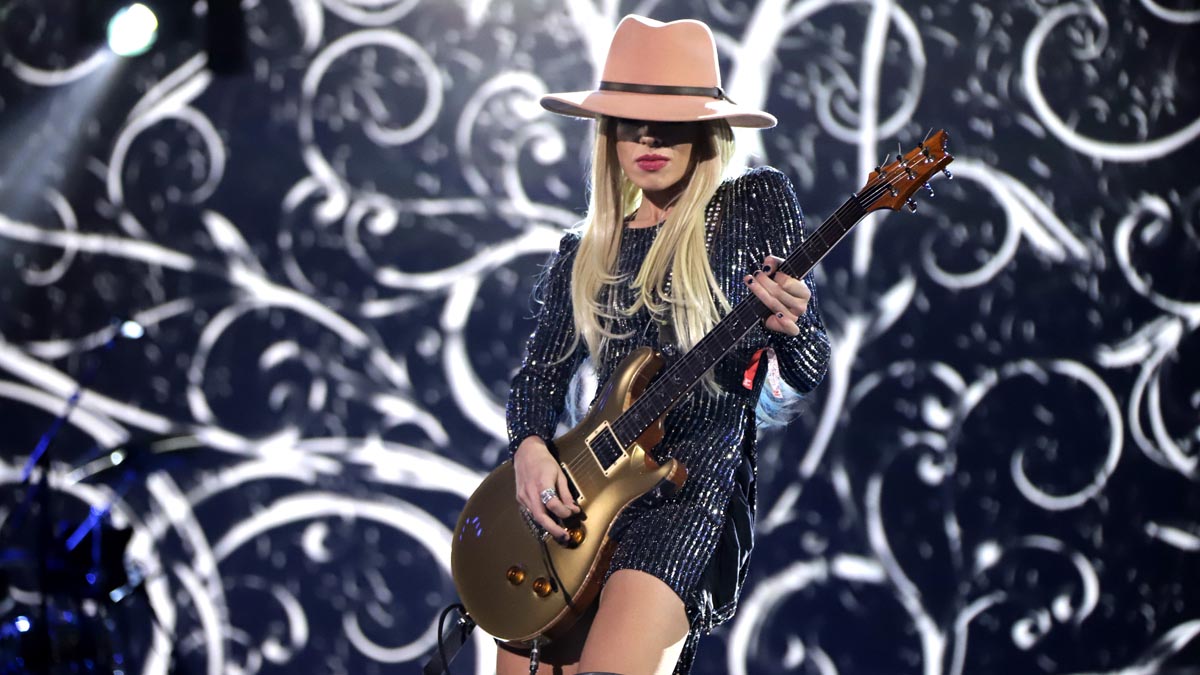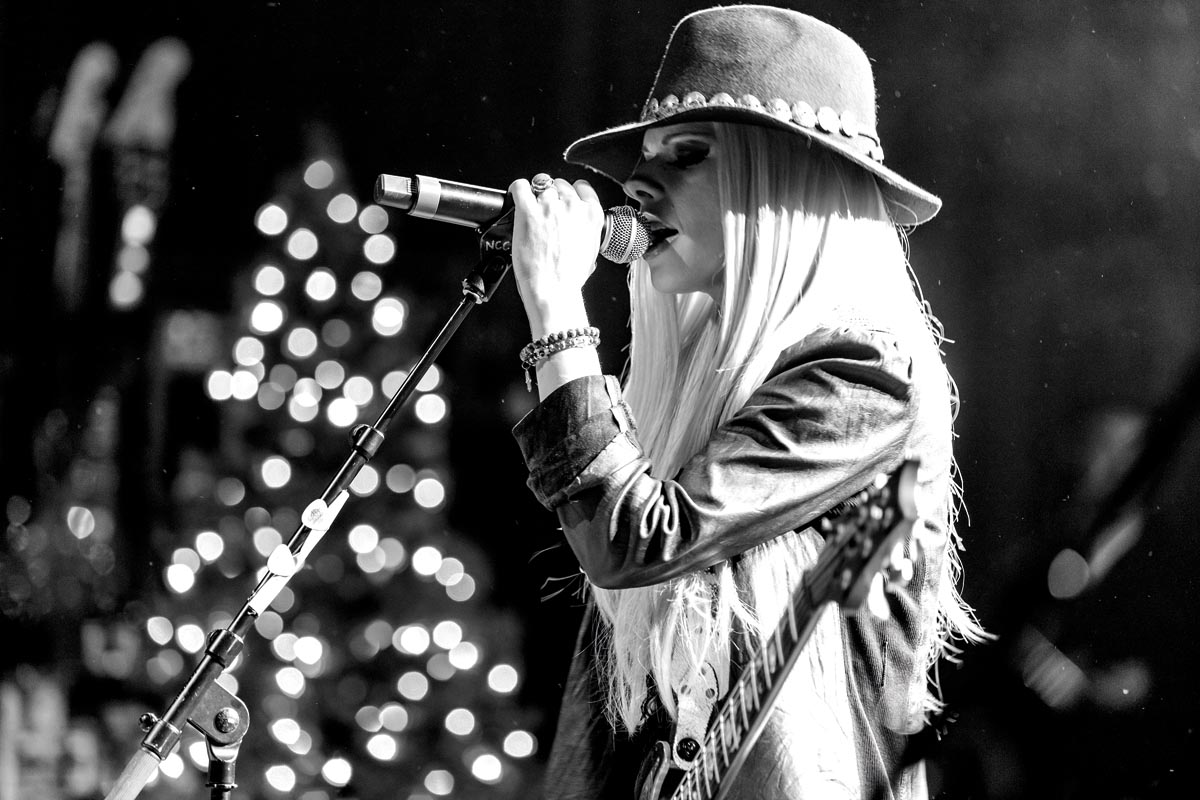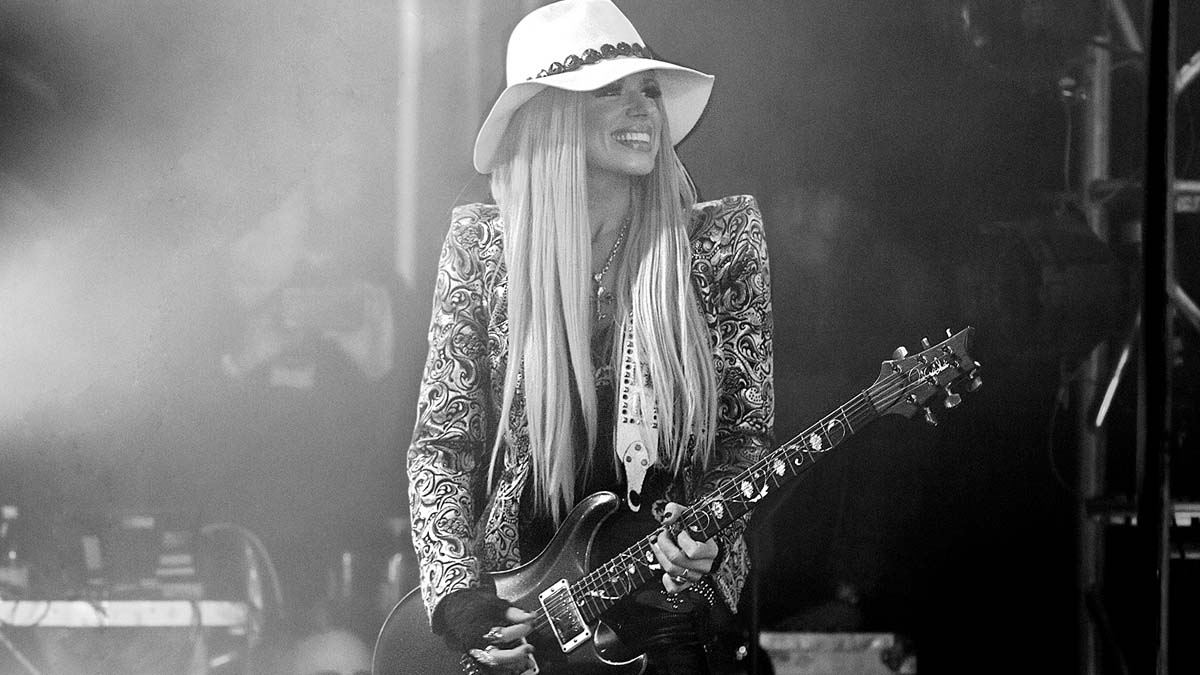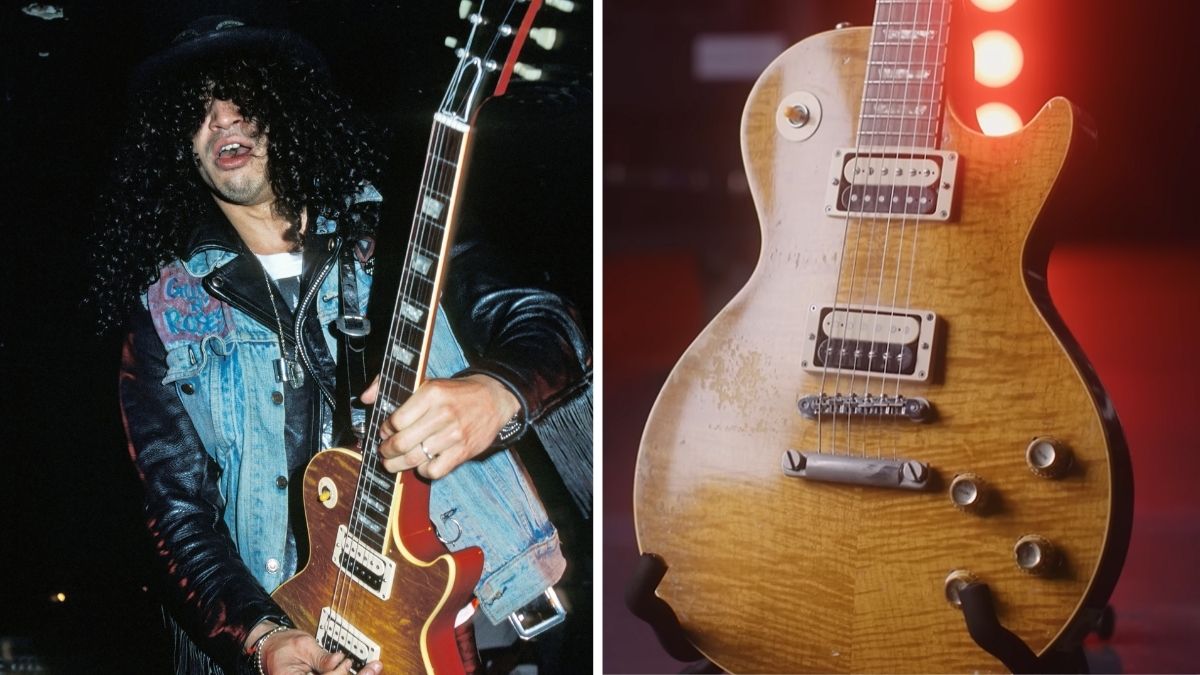Orianthi: “There are endless possibilities when it comes to the sounds you can pull out of a guitar. That’s the most magical thing about it“
The Australian six-string phenom talks signature gear, Michael Jackson, and taking inspiration from the greats

All the latest guitar news, interviews, lessons, reviews, deals and more, direct to your inbox!
You are now subscribed
Your newsletter sign-up was successful
“We made the record in about 28 days,” says Australian guitar queen Orianthi, whose new album, O, arrives some seven-plus years after its predecessor, 2013’s Heaven in This Hell.
The 10 tracks were produced by Marti Frederiksen, with his 21-year-old son, Evan, contributing bass guitar and drums.
“It took a long time to get ’round to it because I was busy with different collaborative creative efforts. And I’m really proud of all the things I’ve done in the time since my last record. There was the RSO stuff [with Richie Sambora] plus writing and touring with all these other artists. But it felt like it was time to make my next solo album.”
The new music weaves through all kinds of guitar tones, from more metallic affairs to country and pop sounds – every bit as diverse as you’d expect from someone who has played for artists as varied as Michael Jackson, Alice Cooper and Michael Bolton.
She’s composed for Bollywood soundtracks and can be heard on tracks by Anastacia, Adam Lambert and 50 Cent.
“I listen to a lot of different music, so it is pretty diverse,” Orianthi says. “I was listening to a lot of INXS, Jimi Hendrix and Nineties stuff like Nine Inch Nails, as well as bands like Muse – whose synthy tones probably inspired the heavy octave fuzz on Sinners Hymn.
“I was also listening to a lot of Buddy Guy at the time, like [2001’s] Sweet Tea, so the lyrics were originally written as a poem about a blues band, like a Robert Johnson kinda thing about going into every town, ripping it up and then heading off... a very classic blues story.”
All the latest guitar news, interviews, lessons, reviews, deals and more, direct to your inbox!

You’re holding your PRS Goldtop Custom 24 on the cover of O. Was that your main guitar for the recordings?
“It got used on quite a few of the solos. I also had a Les Paul, an SG, a PRS Custom 22 and this 1970 Tele that Marti owned. It was just there and we liked how it cut through. It got used for layering because you don’t want the same guitar always in there; you want to harness different personalities.
“There was quite a mixture of guitars by the end. For Contagious, we layered Les Pauls, Teles and a PRS. I think there was a [Gibson] Trini Lopez on there somewhere too. I wanted different guitars that you could hear separately, not just this one wall of sound. It needed gravity and texture.“
You became an ambassador for Orange Amps in 2018. What made you decide to switch over?
“For some reason, I’d never played Orange amps before then, and I don’t know why… maybe it was the color? Not that I’m against orange! But somehow I’d tried every other company, like Marshall and EVH, and when I got an Orange Rockerverb mkIII, I felt it had some serious guts but so much clarity.
“I prefer using amp distortion and I was just blown away by the tone of that amp. That’s what got used for the record. They did a custom Rockerverb for me in gold snakeskin, which looks really cool. We’re actually in talks about doing a signature thing.“
I’m not really an effects geek. My dad is; he’s a bit of a collector and has closets full of pedals. I didn’t catch that bug
Is that a DigiTech Whammy we’re hearing on Contagious?
“I can’t remember which version it was, but yeah! We actually found that one in the studio. It was so messed up and scratched, but we plugged it in and it sounded great so we went with it. I’m not really an effects geek.
“My dad is; he’s a bit of a collector and has closets full of pedals. I didn’t catch that bug. When I started touring, I got sent all these rackmounts, but I started to feel like the connection was lost between the guitar and the amp.
“The sound felt disconnected so I stripped it completely back and tend to go with a wah pedal plugged straight in – usually a Cry Baby that I’ve had for ages that was a custom one that was made for me. If I hear a certain sound, I’ll use the pedal that calls for it. And Contagious definitely wanted some Whammy!“
And there’s some kind of phaser on Impulsive.
“We ran different loops in Pro Tools to mess with the sounds afterwards. I recorded everything straight into the amp pretty organically, and it was later when we started modifying the sounds and coming up with patches for extra color or crazy distortion, like on the song Company. Impulsive was mainly the SG, PRS, a Tele and also my Gibson J-200.“
I went to Gibson's Montana factory and I just knew my favorite would always be the J-200. The only problem I found was that the neck didn’t work amazingly for a lead player. I asked if we could make a hybrid acoustic, putting an electric neck on a J-200 acoustic
Of course! You have a new signature acoustic coming out.
“I was actually with Gibson from 2009 to 2011, before I went over to Martin and then to Taylor. I got approached by them recently about a signature acoustic and, of course, the answer was, 'Hell yeah!' – especially with me being such a big Elvis Presley and Johnny Cash fan.
“I went to the Montana factory and I just knew my favorite would always be the J-200. The only problem I found was that the neck didn’t work amazingly for a lead player, even more so if you have small hands like I do. So I asked if we could make a hybrid acoustic, putting an electric neck on a J-200 acoustic.
“They followed me down the rabbit hole. It was the first time in history they’ve done an acoustic guitar with an ES-345 neck. LR Baggs worked on the pickups with me to focus more on the mid-range. I find it so comfortable for leads – you can shred on it, basically. We even put amethyst crystals on the pickguard so it has this energy to it.“
Your PRS collection must be pretty extensive by now. Which would you say are your favorites?
“The first PRS I ever had was from the '80s; my dad got it for me when I was 11. It’s pretty heavy. I think it’s a 1987 model so only a few years after Paul established the company, I guess. It lives in my vault in Australia, along with some of my Private Stock instruments. I did two SE models that sold out.
“I also designed the ones for the Alice Cooper tours with the blood all over them. Paul made them really fast – so fast that when he put them in the cases, some of the fluff inside got stuck in the paint. They looked great… like a beast had been murdered!“
If you keep a guitar in a vault, no one’s really seeing or using them. I think people should see and play guitars.
Do you still have the “MJ” Custom 24 that was decorated with Swarovski crystals for the Michael Jackson tour?
“That one is actually being displayed in China right now. One of my Alice Cooper guitars is being displayed in Matt’s Guitar Shop in Paris; it’s a white one with red blood that was used at Wacken Festival and for some of the Hollywood Vampires recordings. If you keep a guitar in a vault, no one’s really seeing or using them. I think people should see and play guitars.
Which guitars are you mainly playing at the moment?
“I’ve been playing my Flying V a lot. I used it for the Sinners Hymn video shoot. I think it’s the 1970 Hendrix reissue. I’ve also been writing a lot on my new signature acoustic.“

Is there anything you learned that helped inspire your playing on the new album?
“I’ve been playing a lot without a pick, probably because I’m losing them all the time! It’s amazing what Jeff Beck can accomplish using just his fingers. I love Jeff. He must be an alien or something because he just seems to get better and better.
“I was backstage at the Classic Rock awards one time with Jeff and Johnny Depp and a bunch of people. Jeff had a guitar plugged into an amp and was just jamming on the couch in front of me. It was insane. His tones and note choices are pretty wild. So hybrid picking actually helps me play faster, I think.
“There are endless possibilities when it comes to the sounds you can pull out of a guitar. That’s the most magical thing about it. The more you sit with it, the more you’ll learn about yourself.
“Other players can influence you, too – I’ve been jamming a lot with [the Doors’] Robby Krieger. He’s an incredible guitarist, and we’ve written a few songs at his studio. It’s all about opening your mind. I love anything out of the box.“
Speaking of which, you were championed very early on by Steve Vai.
“When I was 15, I opened for Steve in Australia. He became a great friend, almost like an uncle. I just remember getting up on stage with a backing track and no band at the Heaven nightclub in Adelaide. Everyone had their arms folded because I was this young girl opening for this monster player.
“Steve was watching the whole thing and told me to send my demos so he could help me out. He did that for years and he didn’t have to! He helped make me a better player and writer by listening to demos and tell me which parts he liked and which he felt needed changing.“
Santana is the reason I picked up the electric guitar. My dad took me to the Dance of the Rainbow Serpent tour when I was 11. I remember turning to my dad and saying, 'I don’t want to play classical anymore. I want to play electric!'
Is Carlos Santana still the player who most impacted your life?
“Santana is the reason I picked up the electric guitar. My dad had Abraxas. I remember putting it on one day and thinking it was beautiful and amazing. Then my dad took me to the Dance of the Rainbow Serpent tour when I was 11.
“He went into Europa and I remember turning to my dad and saying, 'I don’t want to play classical anymore. I want to play electric!' I sent my demo to his management office when I was 14 and got an email from Carlos’ brother Jorge – who sadly passed but was an amazing player – saying they had been playing it in the office and loved it.
“He sent it on to PRS and I ended up getting a call from Paul. When I was 18, Santana came to Australia and I got the opportunity to jam with him.“
And what was he like?
”He could have just signed my guitar and I’d have been happy with that, but he let me play his guitar and he played that Custom 24 my dad got me. I was a bit of a zombie that day because I was playing in three different cover bands and hadn’t slept. But I knew every Carlos song, so when he said, ‘Do you want to jam with my band in front of 15,000 people?’ and pretty much took me straight out on stage.
”He kept me on for 45 minutes because I knew every song, and kept telling me to take solos. I looked around and it was the same lineup as on the Sacred Fire video I would practice to. After that, Carlos stayed in contact and I would go over to the U.S. to play the NAMM Show. I just kept playing until eventually someone from Interscope was in the audience.
”I’d made my own demo, playing every instrument at home, and Jimmy Iovine got it. I worked my arse off for years and eventually got my album out. It was such a process looking back now. This industry is not for anyone who wants to rest or have downtime. It’s 24/7.”
Well, all that hard work paid off when you were chosen for Michael Jackson’s This Is It tour, which would have been the biggest guitar gig in the world.
”I know, right? It came out of the blue. I was making my album with Interscope, in a vocal booth with Diane Warren! We were doing a song and I got this message on MySpace from Michael’s musical director, saying that Michael had been watching my YouTube videos and seen me at the Grammys with Carrie Underwood and decided I was what he was looking for on this new tour.
”I was like, ‘What, is this for real?!’ And they set up a call later that night, asking if I could learn Beat It, Wanna Be Startin’ Somethin’ and Dirty Diana for the next morning. Being a huge fan of Eddie Van Halen and Jennifer Batten, my answer was, “Um, sure?!” I knew I wasn’t that kind of player by any means, I certainly wasn’t going to try and fill their shoes.”
When people heard me doing the Beat It solo, they said I wasn’t doing it exactly – but that’s not how I play! I can’t play like Eddie or Jennifer; they’re incredible. You should have your own fingerprint on things
What did you end up doing?
“I decided to do my own thing. I learned everything note-for-note but added my own identity. When people heard me doing the Beat It solo, they said I wasn’t doing it exactly – but that’s not how I play! I can’t play like Eddie or Jennifer; they’re incredible. You should have your own fingerprint on things. If people don’t like it, they don’t like it.
“Michael loved it, thank God, otherwise I would have been mortified. I got hired that day, so it was very emotional. I started crying and called my mom. We all had to sign confidentiality agreements so we couldn’t tell anyone. Not even my label knew, until they had a meeting with Interscope and it was mentioned I would be on guitar.
“I got a text from Jimmy Iovine saying, 'Oh, just found out!' and I joked, 'Sorry about that!' It was wild. I was playing songs like Billie Jean and Dirty Diana with Michael singing and dancing right in front of me. Then I would be coming home to clean up dog crap and tell my friends I’d been in the studio working on something else! [Laughs]“
- Orianthi's new album, O, is out now via Frontiers.
Amit has been writing for titles like Total Guitar, MusicRadar and Guitar World for over a decade and counts Richie Kotzen, Guthrie Govan and Jeff Beck among his primary influences as a guitar player. He's worked for magazines like Kerrang!, Metal Hammer, Classic Rock, Prog, Record Collector, Planet Rock, Rhythm and Bass Player, as well as newspapers like Metro and The Independent, interviewing everyone from Ozzy Osbourne and Lemmy to Slash and Jimmy Page, and once even traded solos with a member of Slayer on a track released internationally. As a session guitarist, he's played alongside members of Judas Priest and Uriah Heep in London ensemble Metalworks, as well as handled lead guitars for legends like Glen Matlock (Sex Pistols, The Faces) and Stu Hamm (Steve Vai, Joe Satriani, G3).

